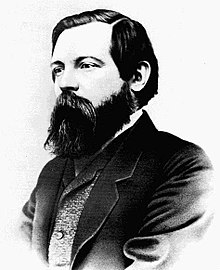Paris: 1843–1845
In 1843, Marx became co-editor of a new, radical leftist Parisian newspaper, the Deutsch-Französische Jahrbücher (German-French Annals), then being set up by the German socialist

Arnold Ruge to bring together German and French radicals, and thus Marx and his wife moved to Paris in October 1843. Initially living with Ruge and his wife communally at 23 Rue Vaneau, they found the living conditions difficult, so moved out following the birth of their daughter Jenny in 1844. Although intended to attract writers from both France and the German states, the Jahrbücher was dominated by the latter; the only non-German writer was the exiled Russian anarchist collectivist Mikhail Bakunin.] Marx contributed two essays to the paper, "Introduction to a Contribution to the Critique of Hegel's Philosophy of Right"and "On the Jewish Question,"[56] the latter introducing his belief that the proletariat were a revolutionary force and marking his embrace of communism. Only one issue was published, but it was relatively successful, largely owing to the inclusion of Heinrich Heine's satirical odes on King Ludwig of Bavaria, leading the German states to ban it and seize imported copies; Ruge nevertheless refused to fund the publication of further issues, and his friendship with Marx broke down. After the paper's collapse, Marx began writing for the only uncensored German-language radical newspaper left, Vorwärts! (Forward!). Based in Paris, the paper was connected to the League of the Just, a utopian socialist secret society of workers and artisans. Marx attended some of their meetings, but did not join.[59] In Vorwärts!, Marx refined his views on socialism based upon Hegelian and Feuerbachian ideas of dialectical materialism, at the same time criticising liberals and other socialists operating in Europe.
On 28 August 1844, Marx met the German socialistFriedrich Engels at the Café de la Régence, beginning a lifelong friendship. Engels showed Marx his recently published The Condition of the Working Class in England in 1844 convincing Marx that the working class would be the agent and instrument of the final revolution in history.Soon Marx and Engels were collaborating on a criticism of the philosophical ideas of Marx's former friend, Bruno Bauer. This work was published in 1845 as The Holy Family. Although critical of Bauer, Marx was increasingly influenced by the ideas of the Young Hegelians Max Stirner and Ludwig Feuerbach, but eventually Marx and Engels abandoned Feuerbachian materialism as well.
During the time that he lived at 38 Rue Vanneau in Paris (from October 1843 until January 1845), Marx engaged in an intensive study of "political economy" (Adam Smith, David Ricardo, James Mill etc.), the French socialists (especially Claude Henri St. Simon and Charles Fourier) and the history of France."The study of political economy is a study that Marx would pursue for the rest of his life and would result in his major economic work—the three-volume series called Capital. Marxism is based in large part on three influences: Hegel's dialectics, French utopian socialism and English economics. Together with his earlier study of Hegel's dialectics, the studying that Marx did during this time in Paris meant that all major components of "Marxism" (or political economy as Marx called it) were in place by the autumn of 1844. Although Marx was constantly being pulled away from his study of political economy by the usual daily demands on his time that everyone faces, and the additional special demands of editing a radical newspaper and later by the demands of organising and directing the efforts of a political party during years in which popular uprisings of the citizenry might at any moment become a revolution, Marx was always drawn back to his economic studies. Marx sought "to understand the inner workings of capitalism."
An outline of "Marxism" had definitely formed in the mind of Karl Marx by late 1844. Indeed, many features of the Marxist view of the world's political economy had been worked out in great detail. However, Marx needed to write down all of the details of his economic world view to further clarify the new economic theory in his own mind. Accordingly, Marx wroteThe Economic and Philosophical Manuscripts. These manuscripts covered numerous topics, detailing Marx's concept of alienated labour. However, by the spring of 1845 his continued study of political economy, capital and capitalism had led Marx to the belief that the new political economic theory that he was espousing—scientific socialism—needed to be built on the base of a thoroughly developed materialistic view of the world.
The Economic and Philosophical Manuscripts of 1844 had been written between April and August 1844. Soon, though, Marx recognised that the Manuscripts had been influenced by some inconsistent ideas of Ludwig Feuerbach. Accordingly, Marx recognised the need to break with Feuerbach's philosophy in favour of historical materialism. Thus, a year later, in April 1845, after moving from Paris to Brussels, Marx wrote his eleven Theses on Feuerbach, The Theses on Feuerbach are best known for Thesis 11, which states that "philosophers have only interpreted the world in various ways, the point is to change it".This work contains Marx's criticism of materialism (for being contemplative), idealism (for reducing practice to theory) overall, criticising philosophy for putting abstract reality above the physical world. It thus introduced the first glimpse at Marx's historical materialism, an argument that the world is changed not by ideas but by actual, physical, material activity and practice. In 1845, after receiving a request from the Prussian king, the French government shut down Vorwärts!, with the interior minister, François Guizot, expelling Marx from France. At this point, Marx moved from Paris to Brussels, where Marx hoped to, once again, continue his study of capitalism and political economy.


No comments:
Post a Comment